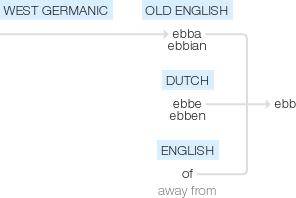Ebb
Old English ebba (noun), ebbian (verb), of West Germanic origin; related to Dutch ebbe (noun), ebben (verb), and ultimately to of which had the primary sense ‘away from’.
wiktionary
From Middle English ebbe, from Old English ebba(“ebb, tide”), from Proto-Germanic *abjô, *abjǭ (compare West Frisian ebbe, Dutch eb, German Ebbe, Danish ebbe, Old Norse efja(“countercurrent”)), from Proto-Germanic *ab(“off, away”), from Proto-Indo-European *apó. (compare Old English af). More at of, off.
etymonline
ebb (n.)
Old English ebba "falling of the tide, low tide," perhaps from Proto-Germanic *af- (source also of Old Frisian ebba, Old Saxon ebbiunga, Middle Dutch ebbe, Dutch eb, German Ebbe), from PIE root *apo- "off, away." Figurative sense of "decline, decay, gradual diminution" is from late 14c. Ebb-tide is from 1776.
ebb (v.)
Old English ebbian "flow back, subside," from the root of ebb (n.). Figurative use in late Old English. Related: Ebbed; ebbing.
